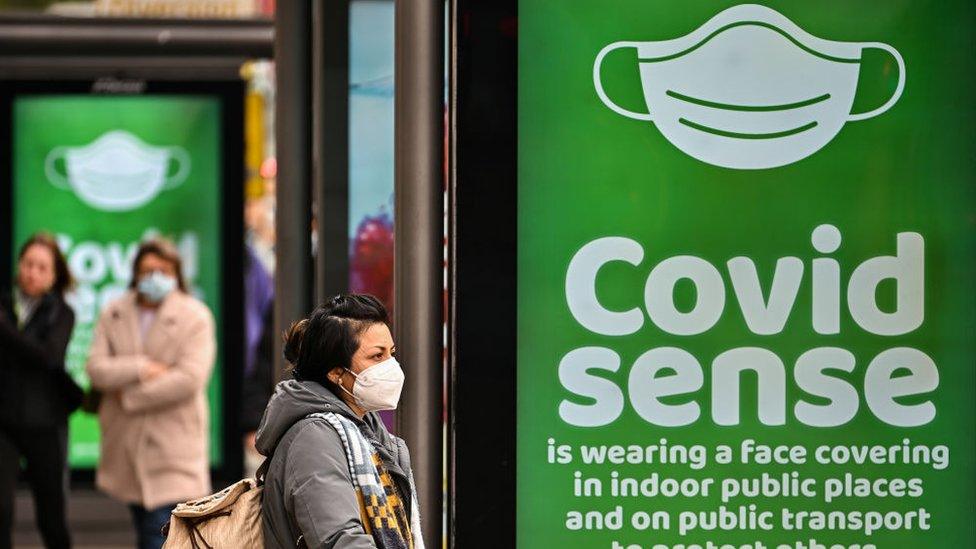Sturgeon rules out moving to phase four - for now
- Published
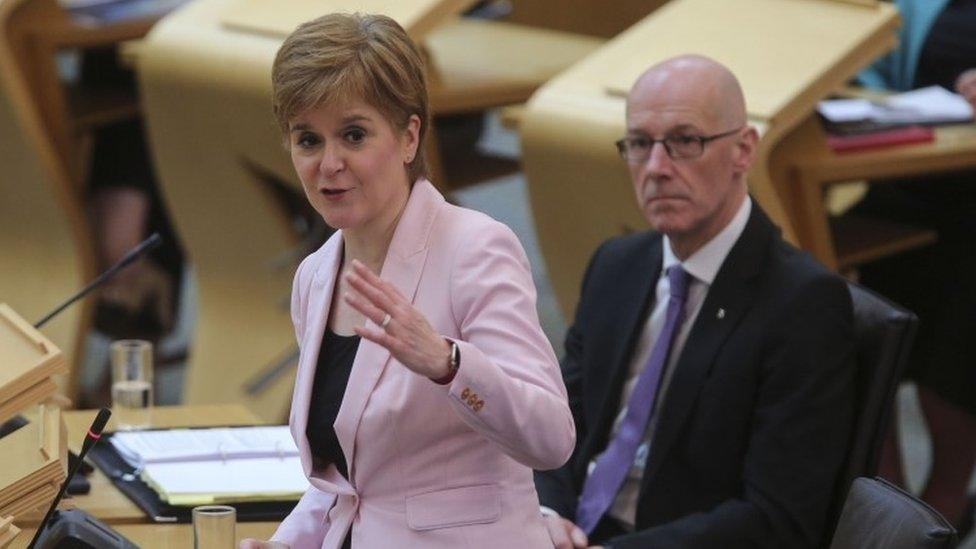
This could have been the day when Nicola Sturgeon announced that we were moving to Phase Four of Scotland's response to coronavirus.
It wasn't. Which tells its own story.
This could have been the day when Nicola Sturgeon announced, as part of a move to Phase Four, that "the virus is no longer considered a significant threat to public health".
She didn't. Which tells its own story.
This, remember, marks the latest statutory review of this hideous plague. Such reviews take place every three weeks.
Previous reviews have resulted in a move to another phase, a formal relaxation of constraints.
But Phase Four has been ruled out for now. And the first minister signalled that she does not currently expect such a move to be feasible at her next statutory review, in a further three weeks' time.
Why? Arithmetic. Numbers moving in the wrong direction - albeit still at very low levels.. A sense that the virus may be accelerating once more - despite other contrary indications of a more positive nature.
Take the most basic number, at the very outset of the FM's Holyrood statement. She had 77 new cases of the virus to record.
In itself, a low number by comparison with Scotland's overall population. But still the highest number of new daily cases in almost three months.
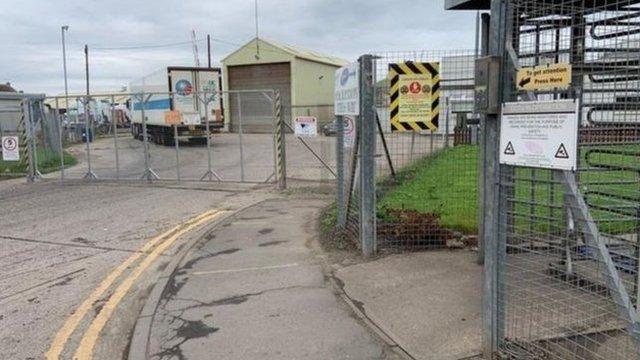
The number of cases linked to the 2 Sisters poultry factory has risen to 43, an increase of 14 since Wednesday
Then there is the local lockdown in Aberdeen. And the cluster connected with a food processing plant in Coupar Angus. And other concerns in Lanarkshire, the north-east of Glasgow and Dundee.
These are not remote statistics of a pandemic, collected by a global institution. These are our people.
Me, I'm a Dundonian. I lived for a few years in Aberdeen. Many decades ago, my family and I used to go to Coupar Angus for high tea on a Sunday. I now live in the west of Scotland.
Phase Four? Behave yourself.
However, alongside these basic statistics, Nicola Sturgeon is aware of other calculations. The impact upon the economy, tracked again in GDP figures and in a warning from Audit Scotland that the virus will substantially affect public spending plans.
And more. The social and psychological effect upon our people, chafing at continuing constraint.
Gyms and swimming pools
And so Ms Sturgeon gave a cautious go-ahead to the reopening of various facilities, such as bingo halls and funfairs. She even brought forward the reopening of gyms and swimming pools, while signalling a tentative restart for theatre and the possible return of limited numbers of spectators to sports stadia.
But at all points there was caution. The FM addressed directly the type of concern she is hearing from anxious, maybe even angry folk.
Why, they ask, can we send kids to school and yet I can't return to my office job?
Ms Sturgeon said she understood the concern. She grasped the apparent anomaly.
But she argued that the priority return of schools was only made possible by sacrifices in other areas which helped hold the virus back.
Kids were only able to return to school, she said, because others were still constrained.
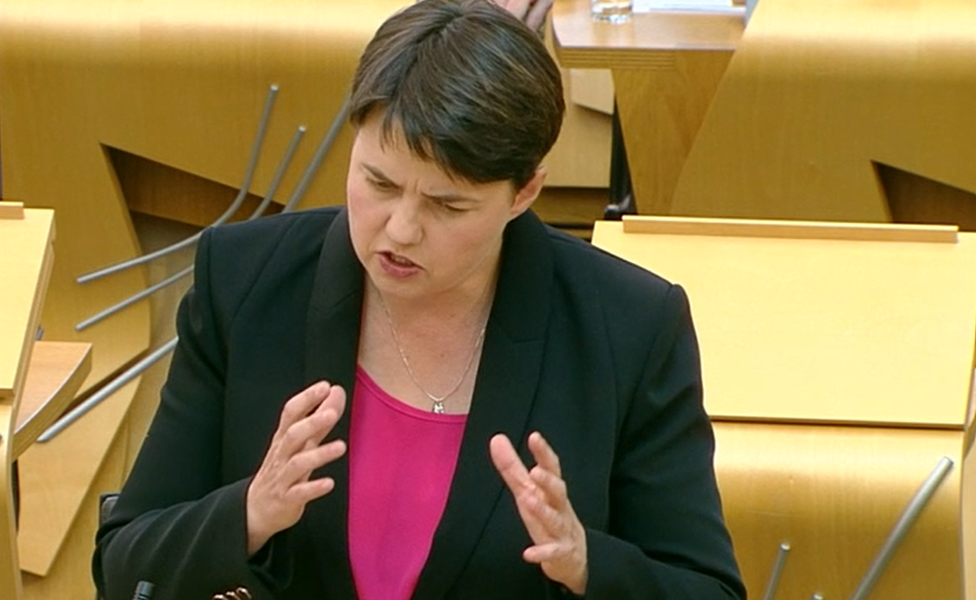
Ruth Davidson questioned the first minister on the transfer of hospital patients to care homes
Instead of media questions, as at a televised briefing, this was parliament. And so it was up to MSPs to question the FM. And they did so, with gusto.
For the Conservatives, Ruth Davidson made her return to the front line in her new role leading the Holyrood Tory group - in the absence of the newly-elected leader, Douglas Ross who is currently at Westminster.
There was no cross-party badinage, as would customarily be the case. No insincere words of welcome and reply. Instead, Ms Davidson got right to it.
She thanked the first minister for the usual advance copy of her statement - then moved immediately to a topic which had not been mentioned. Care homes.
Had ministers known, she asked, that some people had been transferred from hospital to care homes while testing positive for the virus? Did they know prior to publication of a story in The Sunday Post?
Ms Sturgeon noted that clinical decisions were….decisions for clinicians to take. Not for ministers.
The role of government, she said, was to provide public health guidance. Said guidance, issued on 13 of March, had stressed the need for clinical screening prior to any discharge of patients. Such guidance had been enhanced since.
She said further that she welcomed scrutiny - and would, in comparable fashion, welcome the expected public inquiry into the handling of the virus by ministers and officials.
Democratic politics
Ms Davidson persisted. She cited an individual case of a woman who had talked to the police about the death of her mother in a care home. Said daughter, according to the Tory leader, did not blame the carers in any way. She blamed the system.
The FM had plainly heard enough. Such matters are simply too serious to prompt anything other than a calm sough.
But Nicola Sturgeon could not entirely resist the voice in her other ear, reminding her of partisan politics.
Firstly, she said that such matters were common to governments across these islands. Translation: the Tories are doing this in England, have a word with the PM, why don't you?
Secondly, she reminded the chamber en passant that Ms Davidson intended to leave Holyrood at the next elections in order to take up a seat in the House of Lords.
With calculated irony, she noted that her interlocutor was planning to depart from democratic politics - but should still be aware of the division of responsibilities which meant that ministers didn't tell clinicians or the police what to do.
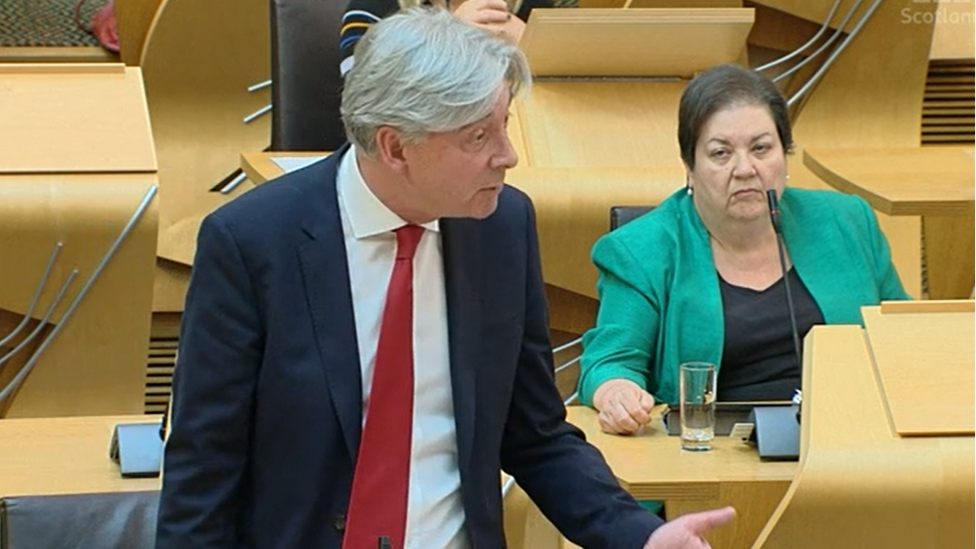
Richard Leonard also pursued the issue of care homes
Was Ms Davidson cowed and subdued? Far from it. Rather, she urged the immediate establishment of investigations into both the health and judicial aspects of the virus.
This appeared to exasperate Ms Sturgeon still further. It would be wrong, she declared, to divert attention and the time of staff away from dealing, day and night, with the pandemic.
The inquiry would arrive in due course. Meanwhile, she was content to subject herself to the verdict of the electorate. Unlike, she implied, Ms Davidson.
The exchanges with other leaders were less acerbic, but comparably substantive.
Labour's Richard Leonard also pursued the issue of care homes, disclosing Freedom of Information data suggesting that 1,200 people had been discharged from hospital to care homes without testing. The overall figure, he said, would have been higher if all health boards had responded.
Ms Sturgeon repeated her government's policy position from the early days of the virus, noting that it had since responded to changing events.
'Utterly ridiculous'
Patrick Harvie of the Greens asked some decidedly pointed questions about coping with the virus in school. He warned of crowded corridors and inadvertent breaches of health guidance.
Ms Sturgeon conceded her concerns - while stressing there was no immediate evidence of transmission within schools. However, she hinted that there may be more to come on the deployment of face coverings in school premises.
For the Liberal Democrats, Willie Rennie was also commendably focused. He pursued the topic of the testing of people arriving in Scotland: perhaps students, perhaps people from countries requiring quarantine.
Sundry figures were bandied about. The gist of it all was that Mr Rennie simply did not trust the Scottish government to pursue a system of testing such arrivals.
Then the acerbic note again. Mr Rennie said the FM would be better focusing on international borders - rather than the border with England.
Ms Sturgeon arose, slowly. Such comments, she said, were "completely and utterly ridiculous".
Attempting to offer a rebuttal, she said her sole concern was to protect the people of Scotland against a dangerous and deadly virus.
- Published20 August 2020
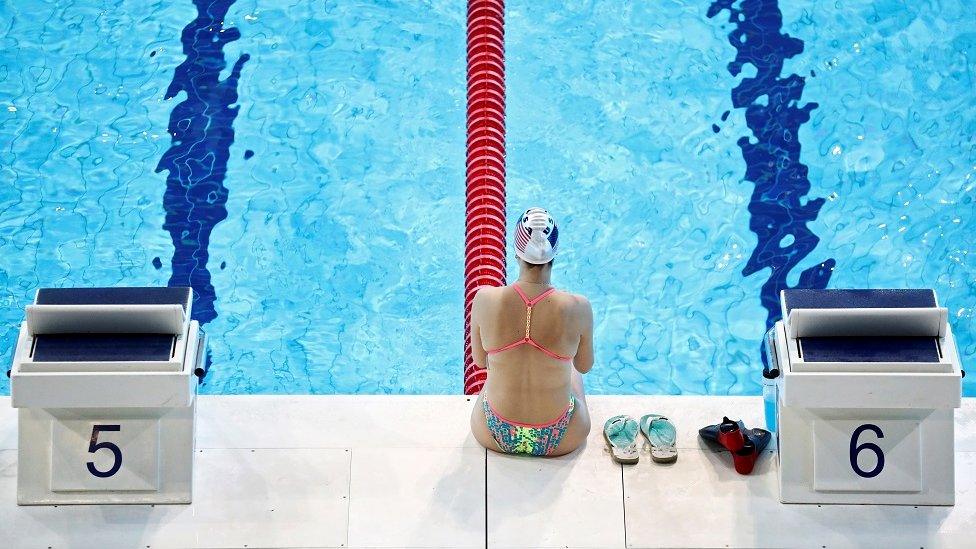
- Published1 July 2022
